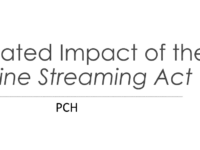The government’s support for Bill C-11 has often been framed on economic terms with Canadian Heritage Minister Pablo Rodriguez arguing that the bill will “create good jobs for Canadians in the cultural sector”. I’ve long maintained the government’s claims that the bill will generate billions of dollars in new money was massively exaggerated and that a far more likely scenario would be that the bill would simply lead to a reshuffling of existing expenditures.
Using the Access to Information Act, I have now obtained a copy of the government’s internal estimates for the economic and production impact of Bill C-11 (methodology, memorandum, PPT), which confirm many of my suspicions. While the government is pinning its hopes on massive spending from Internet streamers such as Netflix, it admits that even if the bill did not pass it would not affect net new employment in the sector. Moreover, internally the government recognizes the claim that Netflix and foreign streamers don’t contribute to Canadian content is false, as it has identifies a new category of “unofficial Cancon” which would qualify as Cancon under every measure but for the fact that it is owned by companies like Netflix and Disney. And as for the payments from social media companies that the government insists are so essential that it has fought for years to include user content regulation in the bill? The estimated economic benefit represents just one percent of its total projection for Bill C-11 with pure guesswork about what percentage of content on the platforms might require contributions.











